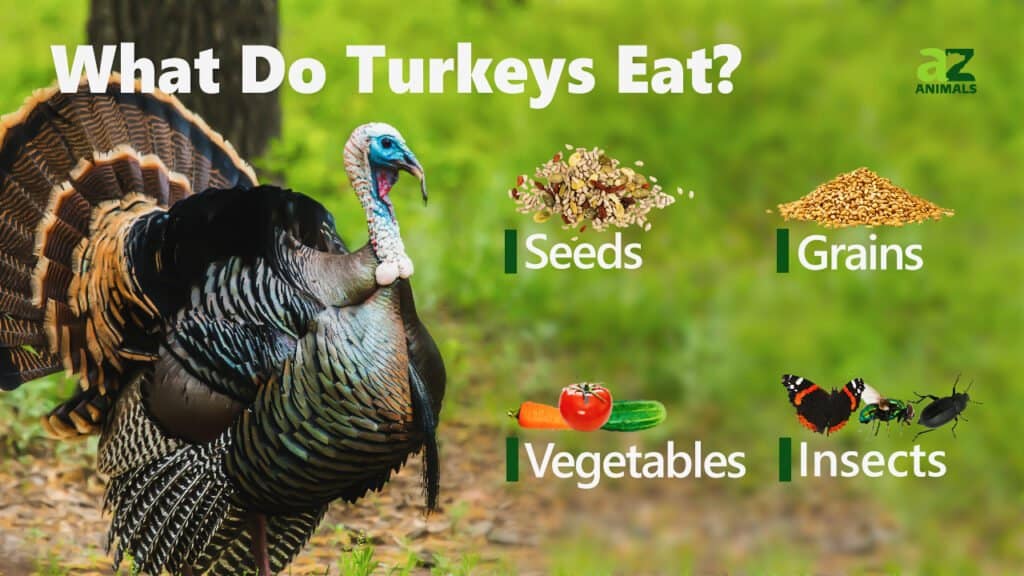Wild turkeys are fascinating creatures that roam freely in our forests and fields. With their majestic appearance and unique behaviors, it’s no wonder that people are often curious about whether it’s acceptable to feed them. In this article, we will explore the pros and cons of feeding wild turkeys.

Credit: a-z-animals.com
Pros of Feeding Wild Turkeys
1. Conservation and Preservation: By providing wild turkeys with supplemental food, you can help ensure their survival, especially during periods when natural food sources are scarce. This can contribute to the overall conservation and preservation efforts for these magnificent birds.
2. Educational Advantage: Feeding wild turkeys can be an excellent opportunity to observe their behavior up close, which can be educational for both children and adults. It allows us to gain a better understanding of their feeding patterns and social interactions.
3. Photography and Bird-Watching: Attracting turkeys with food can provide photographers and bird-watchers with remarkable opportunities to capture stunning images and study these magnificent birds’ behavior in their natural habitat.
4. Community Bonding: Feeding wild turkeys can create a sense of community as people come together to appreciate and care for nature. It can become a bonding activity for neighbors and families, fostering a shared interest and appreciation for wildlife.

Credit: blog.nwf.org
Cons of Feeding Wild Turkeys
1. Dependency: When wild turkeys become reliant on human-provided food, it can disrupt their natural foraging behaviors and alter their migration patterns. This dependency can lead to negative consequences for the turkeys, including reduced foraging skills and increased susceptibility to predators.
2. Environmental Impact: Excessive feeding can negatively impact the environment and other wildlife species. Overcrowding at feeding spots can result in competition, aggression, and the spread of diseases among the turkeys. It can also attract unwanted pests like rats or raccoons.
3. Health Risks: Improper or contaminated feeding can introduce diseases or parasites among wild turkeys, compromising their health and overall population. It is essential to follow safe and responsible feeding practices if you choose to feed them.
4. Legal Considerations: Feeding wild turkeys may be subject to federal, state, or local regulations. It is crucial to familiarize yourself with these laws to ensure you are not inadvertently breaking any rules.
Tips for Feeding Wild Turkeys Responsibly
1. Natural Foods: Supplemental feeding should be just that, supplemental. The primary diet of wild turkeys should consist of natural food sources such as seeds, nuts, berries, insects, and grasses.
2. Open Areas: Place the feed in open areas away from roads and other potential dangers. It should be easily accessible for the turkeys but not in a location that encourages human-turkey conflicts.
3. Seasonal Considerations: Adjust your feeding routine as per the seasonal needs of wild turkeys. For example, during the winter months or periods of extreme weather, when natural food sources are scarce, you may provide supplemental food to help them survive.
4. Safe Foods: Offer appropriate food items such as cracked corn, birdseed mixes, or fruits. Avoid providing foods that are harmful to wild turkeys, such as bread, salty snacks, or processed human foods.
5. Cleanliness: Maintain cleanliness around the feeding area. Replace food regularly to avoid spoilage and the transmission of diseases.
6. Document and Observe: Use the opportunity to document and observe wild turkeys’ behavior, but do so from a safe distance that does not disturb or stress them.
Frequently Asked Questions Of Is It Ok To Feed Wild Turkeys,
Is It Safe To Feed Wild Turkeys In Your Backyard?
Feeding wild turkeys can lead to increased human-turkey conflicts and disrupt their natural foraging behaviors.
How Does Feeding Wild Turkeys Impact Their Behavior?
Feeding them can habituate turkeys to human presence and alter their natural behavior.
What Are Potential Risks In Feeding Wild Turkeys?
Feeding can increase aggression, spread of diseases, and dependency on human food sources.
What Can Be Done To Support Wild Turkeys Without Feeding Them?
Providing natural habitat, clean water sources, and planting native vegetation can support wild turkey conservation.
Conclusion
Feeding wild turkeys can have both positive and negative implications, so it’s essential to take responsible actions if you choose to do so. Following guidelines, practicing moderation, and keeping the turkeys’ well-being in mind are crucial. Remember, the ultimate goal is to coexist with and preserve these magnificent creatures in their natural habitat.

Leave a Reply